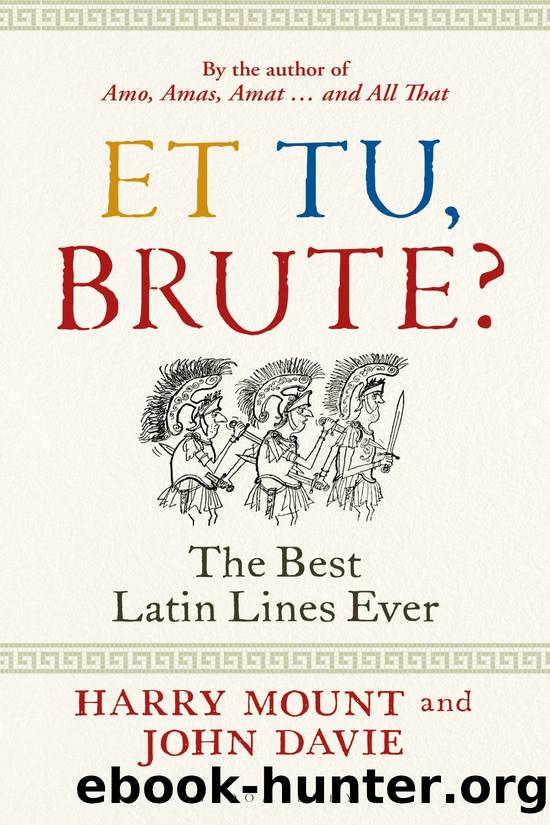Et tu, Brute? by Harry Mount

Author:Harry Mount
Language: eng
Format: epub
ISBN: 9781399400992
Publisher: Bloomsbury Publishing
The five orders of architecture: Tuscan, Doric, Ionic, Corinthian and Composite.
The Greek influence on Latin was enormous, too. Lots of words you think are Latin are really Greek. Nausea (sickness, as in ad nauseam) comes from the Greek word naus, meaning âshipâ; and so it originally meant seasickness.
Greece was conquered by the Roman Republic in the Battle of Corinth in 146 bc. But, still, 200 years later, the Roman rhetorician Quintilian (35â96 ad) was, like Horace, acknowledging Greek supremacy in the arts. Of satire, one of the few art forms the Greeks didnât invent, he said:
Satura quidem tota nostra est.
Satire is indeed entirely our own.
Incidentally, itâs thanks to Quintilian that we have the text message, too. In his book on speeches, Quintilian said that, after you have chosen your words, they must be woven into a fine and delicate fabric â and the Latin for fabric is textum.
Quintilianâs word has clung on for 2,000 years. We still weave stories together, embroider them and try never to lose the thread of the story. Later classical writers took up âtextâ to mean any short passage in a book. More recently, we started using âtextâ to mean anything that was written down; and then somebody invented the SMS message, borrowing Quintilianâs metaphor in the process.
Homer also remained the supreme poet to Romans, as well as Greeks. Itâs this line from Horace that produces our expression, âEven Homer nodsâ or âEven Homer sleepsâ â i.e. even Homer makes mistakes:
Indignor quandoque bonus dormitat Homerus.
Yet I also take it amiss whenever the excellent Homer dozes off.
Horace, Ars Poetica, 359
As the first emperor, Augustus had his lofty position buttressed by Virgil, a genius poet and his propagandist-in-chief. In Virgilâs Aeneid, the sovereign god Jupiter assures his troubled daughter, Venus, that her son Aeneas will triumph in the end â and lay the foundations of an imperium, or empire, on which the sun will never set.
In the Aeneid, Romeâs task is laid out by Anchises, Aeneasâs dead father, who takes him on a tour of the Underworld, pointing out the Roman heroes yet to come. He also declares to his son the purpose of the Roman empire in the future:
Romane, memento . . .
Parcere subiectis et debellare superbos.
Remember, Roman, to spare those whoâve submitted and subdue the arrogant.
Aeneid, 6.847
Itâs also in Book 6 in the Underworld that Virgil describes the dead yearning to be ferried across the River Acheron:
Tendebantque manus ripae ulterioris amore.
They reached out their hands in longing for the further shore.
Aeneid, 6.313
This line is often used to sum up a general feeling of longing. In the same way, this Aeneid line sums up the general sadness of life, as Aeneas weeps at a picture of the Trojan War in a Carthaginian temple:
Sunt lacrimae rerum et mentem mortalia tangunt.
Tears are shed for things even here and mortal things touch the heart.
Aeneid, 1.462
Seamus Heaney translated the famous first three words as âThere are tears at the heart of things.â
The two mournful lines came together in 2011 at the Chilcot Inquiry into the Iraq War.
Download
This site does not store any files on its server. We only index and link to content provided by other sites. Please contact the content providers to delete copyright contents if any and email us, we'll remove relevant links or contents immediately.
Spell It Out by David Crystal(36110)
Professional Troublemaker by Luvvie Ajayi Jones(29651)
The Secret History by Donna Tartt(19058)
We're Going to Need More Wine by Gabrielle Union(19035)
Cat's cradle by Kurt Vonnegut(15339)
The Goal (Off-Campus #4) by Elle Kennedy(13657)
The Social Justice Warrior Handbook by Lisa De Pasquale(12187)
The Break by Marian Keyes(9358)
Crazy Rich Asians by Kevin Kwan(9280)
The remains of the day by Kazuo Ishiguro(8981)
Thirteen Reasons Why by Jay Asher(8894)
Educated by Tara Westover(8047)
The handmaid's tale by Margaret Atwood(7757)
Giovanni's Room by James Baldwin(7330)
Win Bigly by Scott Adams(7184)
This Is How You Lose Her by Junot Diaz(6877)
The Rosie Project by Graeme Simsion(6381)
Six Wakes by Mur Lafferty(6243)
The Power of Now: A Guide to Spiritual Enlightenment by Eckhart Tolle(5760)
